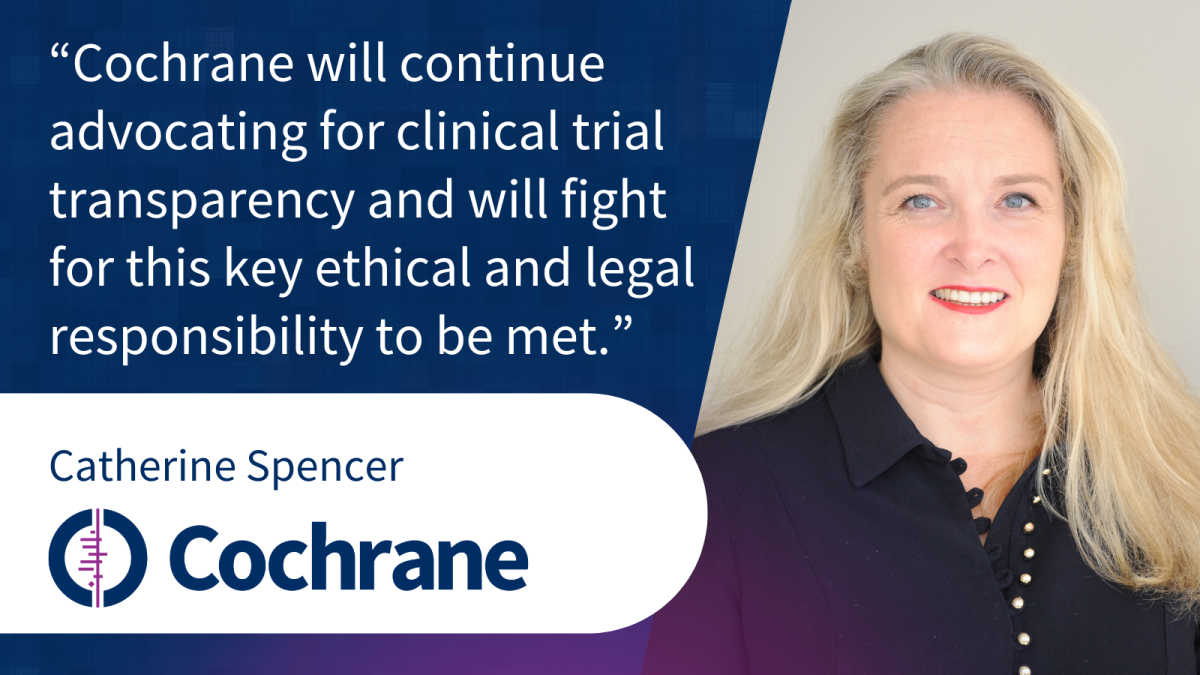
Clinical Trials Day is celebrated on 20 May marking the day in 1747 on which James Lind is believed to have begun the first known controlled trial, comparing different treatments for scurvy which was common among sailors in the British Royal Navy. Watch a video explaining the trial to see history in the making.

Learn about Cochrane systematic reviews and how clinical trials are used:
Continuing to fight for greater clinical trial transparency
Registering and reporting the results of clinical trials is an ethical, and often legal, responsibility. However, it is well documented that the results of many studies are never published. This contributes to research waste and can even lead to people being harmed.
Continuing with Cochrane’s long-term advocacy and campaigning around improved clinical trial transparency, we have been involved in major milestones in this area. Here are some of the highlights from the past 12 months:
Supporting global policy
Cochrane has continued to support WHO with the implementation of resolution WHA75.8 on strengthening clinical trials globally. This includes through responding to and disseminating a public consultation on clinical trials best practice and inviting WHO colleagues to present about the resolution in a session at the Cochrane Colloquium in London. Cochrane’s Editor in Chief, Dr Karla Soares-Weiser, is also contributing to the technical advisory group established to support the resolution in a personal capacity.
Cochrane Denmark, Norway and Sweden advocating to end research waste in Nordic countries
Cochrane Denmark, Cochrane Norway, and Cochrane Sweden, along with AllTrials campaign, the Dam Foundation, Melanomföreningen, and TranspariMED, jointly published a report that found that 475 academically led clinical trials involving 83,903 patients completed during 2016-19 in Denmark, Iceland, Finland, Norway and Sweden have never made their results public in any form. This gained widespread media coverage, including calls from the Norwegian State Secretary for the Ministry of Health to action the findings from the report.
Following the publication of the report, Cochrane groups in Nordic countries have continued to keep attention on the topic by engaging with universities and sending questionnaires to researchers connected to the reported missing trials to investigate why clinical trial data hasn’t been published. To support institutions in reporting in clinical trials, Cochrane Norway and the Dam Foundation also held a webinar aimed at addressing some of the challenged and issues around clinical trial reporting.
Supporting clinical trial transparency in the EU
Representatives of Cochrane, Cochrane France and Cochrane Germany met with the European Medicines Agency (EMA) to discuss how to support the EMA’s Clinical Trials Information System (CTIS) in its transparency objectives in order to benefit health research. The CTIS contains details on clinical trials currently underway and results summaries for completed trials. This is a valuable resource for researchers to identify studies which might not otherwise be accessible for evidence synthesis.
Cochrane Germany push for German university hospitals to publish all clinical trial data
Most recently, Cochrane Germany, alongside the German Network for Evidence-Based Medicine, HTA.de and the BIH Quest Center, published a policy position paper that highlighted that one third of all clinical trials led by German university hospitals between 2014-2017 remained unpublished for five years after completion. They called on the Federal Ministry of Health and the Federal Ministry of Education and Research to create appropriate framework conditions for complete study registration and timely publication of results in Germany and to propose a regulation.

Cochrane’s systematic reviews rely upon the results of clinical trials. To assess the effectiveness and safety of healthcare interventions, we need to know what trials were done, how they were conducted and what their findings were. Without access to detailed information from all clinical trials, we cannot have a full picture of the evidence.
“Cochrane is pleased to be at the forefront of some significant improvements in clinical trial transparency. However, we must ensure that this momentum continues as there is much more to be done globally. We will continue advocating for clinical trial transparency and will fight for this key ethical and legal responsibility to be met.” says Catherine Spencer, Cochrane Chief Executive Officer.
Cochrane's clinical trial transparency advocacy:
- Cochrane Germany reports that one third of all German university clinical trials remain unpublished
- Cochrane Denmark, Sweden, and Norway find that hundred of Nordic Trials remain unpublished
- Cochrane encourages participation in WHO consultations following resolution
- Article by Cochrane France on clinical trial transparency and COVID-19 trials
- Cochrane Convenes report, which covers key issues around clinical trials in emergency conditions
- Cochrane participates in a session on Clinical Trials and COVID-19
- Cochrane Sweden host webinar on clinical trial transparency
- Cochrane Germany article on clinical trial transparency in the EU and advocacy activities in Germany
- Cochrane's statement to the 74th World Health Assembly
- Cochrane shows support for WHO-ICMRA statement on transparency and data integrity
- Cochrane signs letter asking medicines regulators in Europe to address unpublished clinical trials
- US FDA begins enforcement of clinical trial transparency regulation
- Cochrane Belgium partners on clinical trial transparency report
- Cochrane Austria launches joint trial transparency report
- Cochrane Sweden highlights under-reporting of Swedish clinical trials
Cochrane Library systematic reviews of interest:
- Strategies to improve retention in randomised trials
- Factors that impact on recruitment to randomised trials in health care: a qualitative evidence synthesis
Cochrane training resources of interest:
